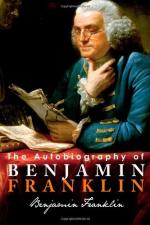The notes one of my uncles (who had the same kind of curiosity in collecting family anecdotes) once put into my hands, furnished me with several particulars relating to our ancestors. From these notes I learned that the family had lived in the same village, Ecton, in Northamptonshire, for three hundred years, and how much longer he knew not (perhaps from the time when the name of Franklin, that before was the name of an order of people, was assumed by them as a surname when others took surnames all over the kingdom), on a freehold of about thirty acres, aided by the smith’s business, which had continued in the family till his time, the eldest son being always bred to that business; a custom which he and my father followed as to their eldest sons. When I searched the registers at Ecton, I found an account of their births, marriages and burials from the year 1555 only, there being no registers kept in that parish at any time preceding. By that register I perceived that I was the youngest son of the youngest son for five generations back. My grandfather Thomas, who was born in 1598, lived at Ecton till he grew too old to follow business longer, when he went to live with his son John, a dyer at Banbury, in Oxfordshire, with whom my father served an apprenticeship. There my grandfather died and lies buried. We saw his gravestone in 1758. His eldest son Thomas lived in the house at Ecton, and left it with the land to his only child, a daughter, who, with her husband, one Fisher, of Wellingborough, sold it to Mr. Isted, now lord of the manor there. My grandfather had four sons that grew up, viz.: Thomas, John, Benjamin and Josiah. I will give you what account I can of them, at this distance from my papers, and if these are not lost in my absence, you will among them find many more particulars.
Thomas was bred a smith under his father; but, being ingenious, and encouraged in learning (as all my brothers were) by an Esquire Palmer, then the principal gentleman in that parish, he qualified himself for the business of scrivener; became a considerable man in the county; was a chief mover of all public-spirited undertakings for the county or town of Northampton, and his own village, of which many instances were related of him; and much taken notice of and patronized by the then Lord Halifax. He died in 1702, January 6, old style, just four years to a day before I was born. The account we received of his life and character from some old people at Ecton, I remember, struck you as something extraordinary, from its similarity to what you knew of mine.
“Had he died on the same day,” you said, “one might have supposed a transmigration.”




